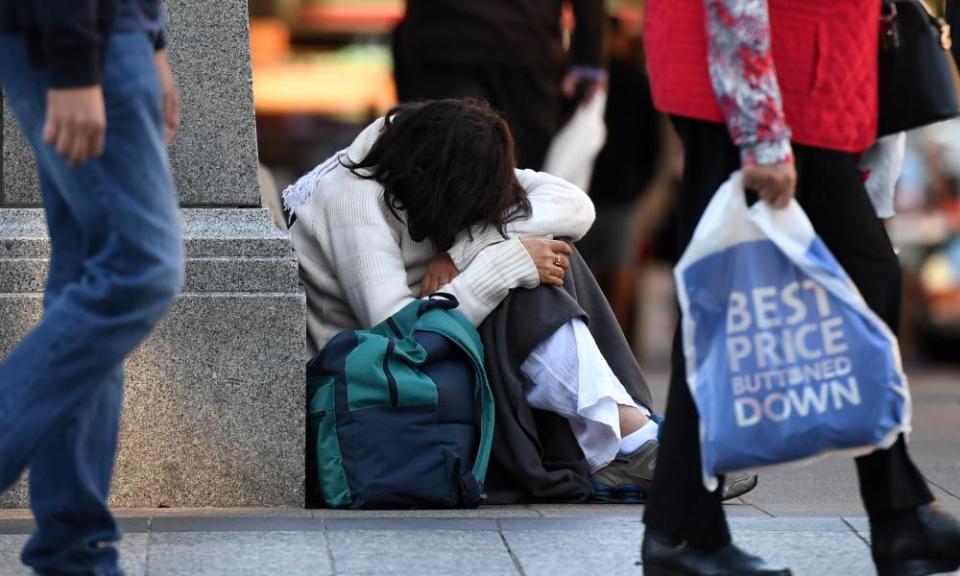Australia's leaders don't even try to understand the working poor

Every child who has grown up in poverty or among the working poor has lived through their own personal recession.
While it might be technically true that the current economic contraction and its attendant devastation is the first witnessed by people under the age of 30 in Australia, this clinical fact only has meaning for those who were raised with enough. For the rest of us, the terrain is familiar.
After all, what is a recession but surplus insecurity, the loss of opportunity and scarcity of hope?
Many of us believe that money measures worth and moral character. It never has
We’ve been here before, in our homes with hyper-stressed parents agonising over choices that aren’t really choices and clinging to an emaciated dream that the next job might pay the bills and steady the descent. We did it when times were good for everyone else; when the economy was booming.
Even bearing witness to the effort of survival, as my siblings and I did when we observed our mum Deb scribble sums in her notepad each evening, can bend a mind.
The brain remembers. A bank balance can come good after much effort but later in life the architecture of the mind cannot be so easily bought.
And that’s the best-case scenario.
Here’s the thing, though. We really are in a recession now. Our political leaders won’t learn the lessons from people who have struggled before because, in some cases, they are invested in prolonging that struggle.
Scott Morrison’s “have a go, get a go” mantra was sclerotic and patently untrue when he first said it but its invocation now has never looked more absurd.
In May, according to Anglicare Australia, there were 106 jobseekers for every entry-level job advertised in that month. To tally that in the rudimentary arithmetic of the prime minister it looks like this: almost 110 goes had, just one go received.
Of course, structurally speaking, access to a job or a liveable safety net is only the beginning. The psychology of a recession, personal or otherwise, is just as important as its immediate demand on resources.
In a September 2019 paper published in the journal Clinical Psychological Science, Macquarie University senior research fellow Miriam K Forbes provides the first real evidence the Great Recession in the United States of America – from December 2007 to June 2009 – had a pernicious effect on mental health.
Against a backdrop of population-level gains in wellbeing, Forbes writes, “individuals who had experienced even a single financial, job-related or housing impact during the recession still had higher odds of symptoms of depression, generalised anxiety, panic, and problematic substance use three to four years after recession had ended.”
That’s just one event. Imagine a series of unrelenting battles. According to the Productivity Commission (2018), there are about 700,000 people who live in persistent and deep income poverty in Australia. It is no minor coincidence that, before the Covid-19 pandemic shut down the country, this was almost precisely the number of people — 728,000 — on the old Newstart allowance, now the jobseeker payment. In a matter of days that figure doubled to 1.44m.
Now, it’s not like the federal government didn’t understand the significance of this economic shock. To absorb some of the devastation, a supplement to the payment rate of $550 a fortnight was added.
It was a tacit admission that, without intervention, the allowance was simply not enough to live on.
Things had been that way for more than a quarter of a century, for those “undeserving” types with chronic health problems and multiple layers of disadvantage. But the national shutdown had thrown the have-a-go cohort into the mix and this changed the dynamic.
It is revealing, I think, that as a nation we sought to save the newly unemployed from distress and the long tail of penury but not the ones who were already caught in that cycle from years before. In any case, the supplement has been cut and is due to shrink or disappear entirely by year end.
This is the thing that rankles. People like Scott Morrison and Josh Frydenberg — and even Julia Gillard when she crowbarred the remaining single parents (mostly mums) from a more generous payment into poverty — can never really understand the claustrophobia of having nothing.
It would be nice if they tried, though.
Money is a force that acts on time and space. It can extend both, quite literally prolonging our lives, if there is enough of it. And its absence can shrink the borders of our world. The lack of it can and does cut short our time on this Earth.
Vast chunks of the Australian welfare apparatus, and especially the malignant employment services sector, exist because we just do not trust poor people with cash. In the latter case, it actually costs money to enforce this instinct.
There has been no effort to understand the psychology of bare-knuckle survival. Rather, a prodigious, emotionally barren attempt at blame and punishment has taken root. And, like the foundations of prosperity gospel, we have allowed it to happen because many of us believe in the atomic truth of these welfare proposals: that money measures worth and moral character.
It never has.
• Rick Morton is an Australian journalist and author. On Money (Hachette Australia) is out Tuesday

 Yahoo News
Yahoo News 